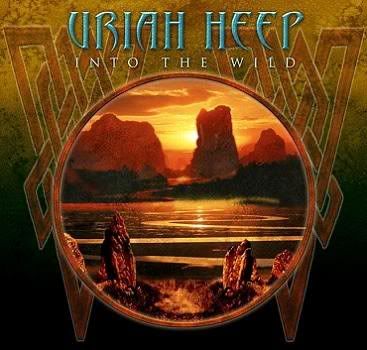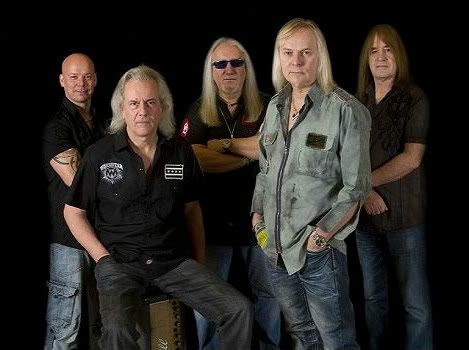Post by Erik Rupp on Aug 28, 2011 13:15:34 GMT -5


As unlikely as it may seem, not only does Uriah Heep have a new album out in 2011, but it is arguably one of their best albums to date - if not the best that they've ever released!
With a bunch of guys ranging from their mid 50's to mid 60's (with new drummer Russell Gilbrook being the, "Kid," in the band at only 47), Uriah Heep isn't exactly a band filled with youth. But while youth is often equated with the best Rock music, Uriah Heep is one of those bands who have proven that older musicians can also have a lot of energy and passion when it comes to songwriting and live performances.
Into The Wild may just be Uriah Heep's heaviest and most energetic album to date, but that energy and heaviness doesn't come at the expense of melody or musical sophistication. This is an album that was definitely written by guys at the tail end of middle age (well, darned near senior citizen status for three of them), but not in a way that makes it inaccessible for younger listeners. It's a timeless album showing the kind of class that Uriah Heep has often been known for (Abominog album cover notwithstanding).
Musically, this is definitely an album rooted in Heep's own past, but also showing hints of the influence of other bands on Heep. It really is a combination of much of Uriah Heep's back catalog with Machine Head era Deep Purple, as well as The Battle Rages On & Purpendicular era Deep Purple styles, as well as Dio-era Black Sabbath, and even some things that Iron Maiden has been doing over the last 11 years or so.
The songwriting on Into The Wild is of the highest caliber. There is some excellent music to be found on the album, and the vocal melodies and hooks are outstanding as well. This is a classy, melodic album that just happens to have a lot of high energy Hard Rock and moderate Heavy Metal songs on it. It is a mature album that doesn't sound like an old band wrote or performed it. The fact that these guys could crank out an album with this much passion and energy at their ages is amazing. It is doubtful that in the late 70's anyone in the music industry would have given Uriah Heep any chance to even be in existence as a current band in 2011, let alone releasing an album as vital as this one is.
They open the album with the thumping, mid-tempo sing along song, "Nail on the Head," which actually shows something of a KISS influence (and Heep did open for KISS in the 70's). This is actually something that KISS might write and record if they were willing to act their ages and show a little musical maturity - and added Deep Purple's Jon Lord on Hammond organ. (Not that there's anything inherently wrong with what KISS does, but this is a little more interesting.) "Nail on the Head," is catchy, and features a really nice uptempo solo section. This is the perfect single for the album as it makes for a great live song. And it's a damned good song, too!
Then the tempo gets raised. "I Can See You," definitely shows some early Heep on steroids. It's got that quirky melodic sensibility to the vocal part that Heep was often known for in the 70's. Phil Lanzon's Hammond organ is again on prominent display - as it is on most of the album. The Hammond organ is a more powerful Rock instrument than many Rock fans give it credit for, but listening to Heep and Deep Purple it is clearly a musical weapon. Drummer Russell Gilbrook pounds away with power and energy, but also with a sense of purpose and a sense of dynamics that really helps the song. Clearly, he was a great addition to the band when original drummer Lee Kerslake (also ex-Ozzy) had to leave the band due to health issues. "I Can See You," makes for two big winners in a row.
And the band makes it three for three with the title track, which is another high octane, high energy song. This one adds some Maiden-esque melodies vocally without going full bore into heavy Heavy Metal. This is Heavy Metal in a 1970's sense. It's the kind of thing that is now considered to be, "Classic Rock, " but back in the 70's and early 80's was definitely considered Heavy Metal. This is one of the best songs on the album, and that says an awful lot. "Into the Wild," is a great song, period.
Then the Battle Rages On era Deep Purple sounds come into play big time on, "Money Talk." This song would have fit perfectly on that album - and would have also fit fairly well on Purpendicular as well. This one is a mid tempo song with huge riffs. It is infectiously catchy, but doesn't wear out it's welcome even if overplayed - the sign of a great song. So the band is four for four out of the gate. Can they possibly make it five for five?
Yep. They sure can - and did! A pulsing groove comes over the speakers when, "I'm Ready," comes on, leading into some decent riffing and great vocal melodies. Absolutely fantastic vocal melodies and harmonies that include a hook to die for. This is a mature, experienced band that also manages to sound vibrant and fresh. That's a great combination. Add that amazing, somewhat funky groove to the mix and this is a perfect song. Absolutely perfect.
There is no pretentiousness here - just a band doing what they do best, and loving it! Even if the rest of the album were crap it would be worth buying just for the first five songs! They're that good.
And it is at this point that Uriah Heep gets back to being the Uriah Heep of the early 70's. "Trail of Diamonds," echoes the moodier, mellower tracks that Heep included on albums like The Magician's Birthday and Salisbury, complete with the dynamics that often incuded harder & heavier sections. This is the Progressive side of Uriah Heep (combined with just a hint of the 60's psychedelia that was present on most of their early 70's albums). The Hard Rock part of, "Trail," sounds like 80's Heep mixed with Asia and Black Rose or Renegade era Thin Lizzy. This is a song of substance over hooks, and right in the middle of the album is the perfect place for this song. It's good. Very good.
"Southern Star," again echoes 1970's era Uriah Heep with it's melodies and mid tempo moodiness and dynamics. This one being much catchier than the previous track, it isn't quite as good as the first five tracks, but it's still extremely classy and enjoyable. If the first five songs were all home runs, this one is a stand up triple.
After the previous two tracks the album needed an uptempo track in a big way - and Heep delivers! "Believe," is as good as the first five tracks, and it's a burst of energy as well. The verse is very modern Iron Maiden while the chorus sounds like a cross between mid 70's Kansas and late 70's Journey - all through a major Uriah Heep filter, of course. Damn, but this is another great song! The energy and melodies are infectious. Skip this track at your own risk!
More 2000's era Iron Maiden melodies show up on, "Lost," along with some Perfect Strangers and House of Blue Light era Deep Purple sounds. And while the song remids me of those bands it still screams, "URIAH HEEP!" Why? Because Heep was a contemporary of Purple's, and another influence on Iron Maiden (along with Purple). These bands musical styles are all intertwined. This song is one of those mid tempo tracks that has a dark, almost medieval feel to it. Almost. And, yes, this is another great song that is not to be missed.
Things get a little more lighthearted (a little) on, "T-Bird Angel." This one is more AOR in an almost Adult Contemporary Hard Rock kind of way. This isn't a song that a band of twenty-something musicians would write. This is the kind of song that comes from living through the 1950's and 1960's. Those experiences and musical roots make for a different feel and sound than younger bands can produce - even if they're fans of those eras. It's one of those, "You had to be there," kind of things. You can't get the feeling and vibe right unless you grew up in that era. This kind of song was heard often in the early 80's - when the people who grew up as kids in the 50's and 60's were releasing albums. It's a good song - very good. And while it plays fairly well to younger audiences (it is very accessible on all levels), it is going to play better to the over 40 crowd.
Which bring us to the final song on the album, "Kiss of Freedom." More of the mellower recent Maiden-isms show up here, as this song is something of a dark, moody Power Ballad. It's the kind of thing that British bands are extremely adept at writing. Again, this isn't all that far removed from some of Heep's 1970's material, and is a solid way to end the album.
The audio production on the album is also top notch. This is a great sounding album - which is fitting given just how good the songs are. Mike Paxman produced it, Steve Rispin engineered it, and Mark Evans mixed it, and as a team they did an amazing job. The album isn't overproduced in an 80's way, but it doesn't sound low budget, either. It sounds crisp and clean, but also warm - and retains a punch thanks to a great bass tone and some great drum sounds. The mix is pretty much perfect, too.
There isn't anything that is less than very good about Into The Wild, and much of the album is flat out great. How many bands can say that at any point in their career, let alone near the tail end of it?
Uriah Heep can.
4.5/5

